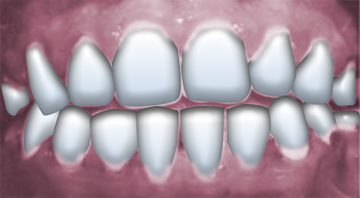The Jaws That Bite

Yesterday, relative to when I'm writing this if not to when you're reading it, I GMed a zombie-themed game for my usual group of players. The players in this particular group are all exceptionally intelligent, very clever people who each have a vast knowledge of popular culture in general and zombie movies in particular, so this was a challenge they were ready to meet. Understandably, the bulk of their preparations focused on one objective: how not to get bitten. This very sensible precaution served them well, and not one single player character was turned into a zombie over the course of the session. Really, though... doesn't "not get bitten" seem like a sensible precaution to take every day? It's a bigger problem in some games that others, obviously, but being bitten by the enemy is rarely a good idea, zombie or not. Zombies may be scary, but let's not forget that humans have one of the deadliest bites in nature.
Really, they do. Don't believe me? Let's look at some of the research.
Lots of things in nature have dangerous bites. The world is full of venomous creatures, most of whom are well-adapted to kill their natural prey but aren't thought of as "poisonous" because they don't delivery dangerous doses to a human-sized creature. Reptiles are the most famous poisonous creatures, but many insects have venom, and there are always odd creatures like the platypus that one might not expect to be venomous until too late (yes, I know that in the platypus it's a venomous claw, not a bite attack... let's not get distracted by details). Other animals have bites which are dangerous because of the deadly bacteria they carry in their mouths. The most famous example of this is the komodo dragon. The jury is still out on whether the deadly bite of the Komodo dragon is a factor of its oral bacteria or its venom; the dragons do have venom sacs, but a number of experts believe that this has little to do with the effect of their bite. Komodo dragon venom is believed to cause severe bleeding, paralysis, and shooting pains, but the real danger from their bite is sepsis, a severe body-wide bacterial infection that can rapidly bring about death. Bacteria from the mouths of wild dragons seem to be unusually virulent and fast-growing -- nobody really knows why -- and dragons raised in captivity, fed clean food, and given antibiotics stop having deadly bites.
It turns out, human bites are kind of like those of the Komodo dragon: they're dangerous because human mouths are really, really dirty. That's a neat trick for a species that doesn't think it of itself as eating carrion. We have limited knowledge about the effect of human bites; in hospitals, they're primarily seen following two men getting into a fist fight and one sustaining an accidental laceration to their fist, although an article in a Nigerian medical journal in 2012 did briefly discuss human bites as a complication of vampirism (seriously, I'm not making that up... I think it may have just been a translation error). Human bites can be dangerous because they tend to be in areas of poor blood supply, so the body can't fight an infection very well, as opposed to dog or cat bites, for example, which are more likely to be in a fleshy and more richly-supplied part of the body. Because of this and other, related factors, almost half of bites to the hand will become infected. Human bites also tend to be polymicrobial, which means that numerous different bacteria tend to get passed along, and this makes it harder to cover all the different species of bacteria with a single antibiotic. Thirdly, human bites transmit bacteria which tend to be very good at living in and around humans. There's very little consensus in the medical literature as to whether or not human oral bacteria actually deadlier than that of other animals, the way Komodo dragons bites are, but it's certainly believed to be the case by some. Oral bacteria has often evolved to help with digestion of foods, so when these bacteria get into the body or the blood, they can cause tissue breakdown and impaired coagulation in addition to merely causing a rapid and severe infection.
My professional advice as a physician: above all, try not to get bitten by zombies, but if at all feasible, try not to get bitten by other things, either. It causes trouble.
A little more than four years ago, Dr. Eris Lis, M.D., began writing a series of brilliant and informative posts on RPGs through the eyes of a medical professional, and this is the one that appeared here on April 21, 2013. Lis is a physician, gamer, and author of the Skirmisher Publishing LLC OGL sourcebook Insults & Injuries, which is also available for the Pathfinder RPG system.






